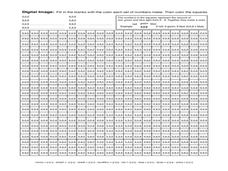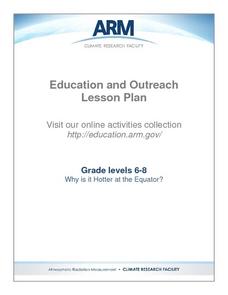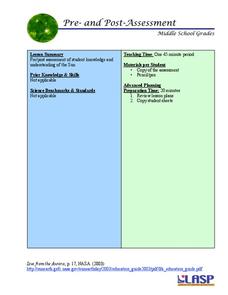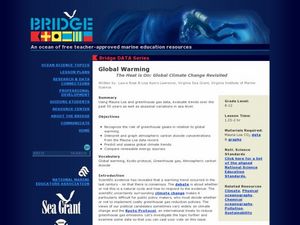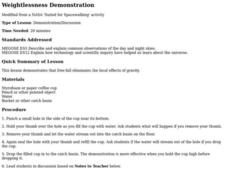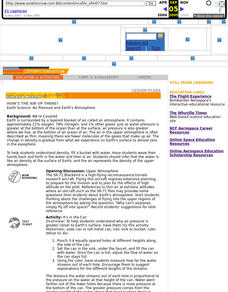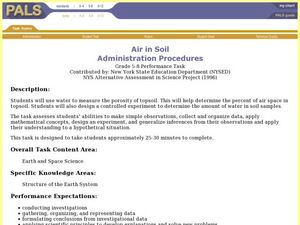Curated OER
The Weather Classroom: Atmosphere
Middle schoolers explore the planets and their atmospheres online. They write the story of "Goldilocks and the Nine Planets" to explain how each planet's atmosphere differs from Earth's. They design a viable life form.
Curated OER
Science: Reading a Compass
Students demonstrate how to take bearings using a compass. In pairs, they select objects in the classroom then write down its first initial and bearing. They exchange papers and try to disciver their partner's object.
Curated OER
Our Amazing, Powerful Sun
Students examine where energy comes from and how it can be used. In this solar energy lesson students explore different aspects of the sun.
Curated OER
Radiation Budget Lesson: Exploring Albedo
Students experiment with sunlight and temperature. They study the definition of albedo, or the percentage of incoming sunlight that is reflected, rather than absorbed.
Curated OER
Imagers: The Adventure of Echo the Bat Number to Pictures: How Satellite Images are Created
Students examine the three primary colors of light and design a numerical code to represent those colors. They tell how satellites use numbers to create satellite images after completing a number of experimental activities.
Curated OER
Identifying Minerals
Learners compare and constrast a wide variety of minerals and rocks. They test them for streak, luster, color and other characteristics. They view an exhibit and compare their answers to them.
Curated OER
Why Is It Hotter At the Equator?
Students investigate the different heating effects of sunlight. They conduct an experiment that demonstrates the way sunlight strikes the equator, the poles and other parts of the globe.
PHET
The Sun: Pre- and Post-Assessment
Want to see how far pupils have come since the beginning of the unit? This activity is designed to be a pre- and post-assessment for a unit on the Sun. The first in a series of 18 that can be combined to form a complete unit. Two...
Curated OER
Astronomy
A broad sampling of material related to stars is covered here. You will want to review each question to see if it corresponds to your curriculum. The formatting is inconsistent, but easily corrected if you use the information to create...
Curated OER
Global Warming - The Heat is On: Global Climate Change Revisited
After listening to your lecture on climate change, young scientists access NOAA's database listing Mauna Loa's carbon dioxide data. They graph the monthly means and then compare their graphs to NOAA's. This is a concise plan that could...
University of Wisconsin
Rain Garden Maintenance
Maintaining a garden is an ongoing responsibility. This resource follows a series of activities in a unit that resulted in the planting of a rain garden. What you will find here are general instructions for watering, weeding, pruning,...
Curated OER
Homemade Barometer
To reinforce the action of air pressure, have your meteorology pupils construct a barometer. They place the barometer into a closed system, a miniature atmosphere if you will, and notice the movement of the needle on the homemade...
Curated OER
Measuring Precipitation
A little engineering design is mixed into this lesson on precipitation measurement. Groups plan and construct a rain gauge, and use it to collect precipitation. As part of the PowerPoint presentation, learners view a satellite map of...
Curated OER
Mission Planning: Geography
Students investigate the use of latitude and longitude to locate specific locations on Earth and evaluate that location as a potential landing site for researchers, terrestrial or alien space missions.
Curated OER
Solar Storms
Students investigate the cycles of solar activity. They plot the solar activity and use the graph to answer a number of questions and explain the relationship between the solar storms and sunspots and the impact on earth and space travel.
Curated OER
Weightlessness Demonstration
Middle schoolers explore the concept that free-fall eliminates the local effects of gravity. They discuss what an Earth-orbiting spacecraft experience is like as well as the terminology of weightlessness. Their lab experiment commences.
Curated OER
Weightlessness
Students predict the behavior of coffee in a cup while it is dropped during a demonstration. They relate their observations to the weightless conditions that astronauts experience in space and discuss the concept of free-fall.
Curated OER
Moon, Mars, and Beyond-Mission Briefing
Students complete this introductory instructional activity in which they find out about the scenario for a simulated online space mission. They review vocabulary and complete a review sheet to reinforce the details of the mission and its...
Curated OER
Modeling Day and Night
Young scholars complete a science experiment to study the role of night and day on sleep patterns. In this sleep patterns lesson plan, students brainstorm about night and day and the causes for the rotations on Earth. Young scholars work...
Curated OER
Color Recognition
Learners envision how space observatories make use of monochromatic filters to collect data on the color of objects in space. They see the actual colors of objects when they are in monochromatic light.
Curated OER
How Things Fly
Students observe photographs of selected twentieth-century aircraft at the National Air and Space Museum and note differences in the design of aircraft wings, fuselages, and engines.
Curated OER
How's the Air Up There?
Students experiment with soda cans and water to discover why air pressure is greater closer to Earth's surface.
Curated OER
Air in Soil Administration Procedures
Students study soil and its composition. For this soil composition lesson, students study examples of soil during several days of aeration. Students summarize their data, organize it, and must be able to explain their findings.




